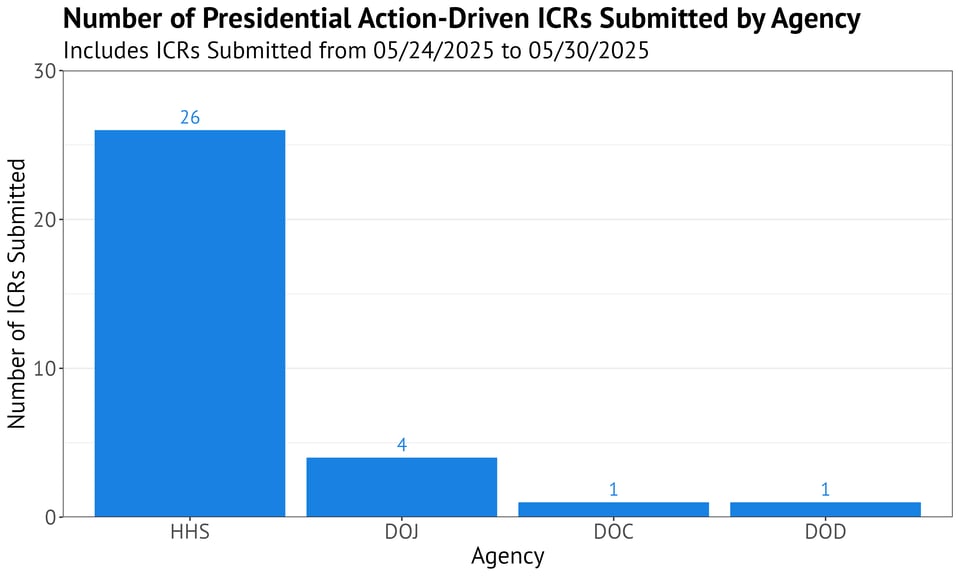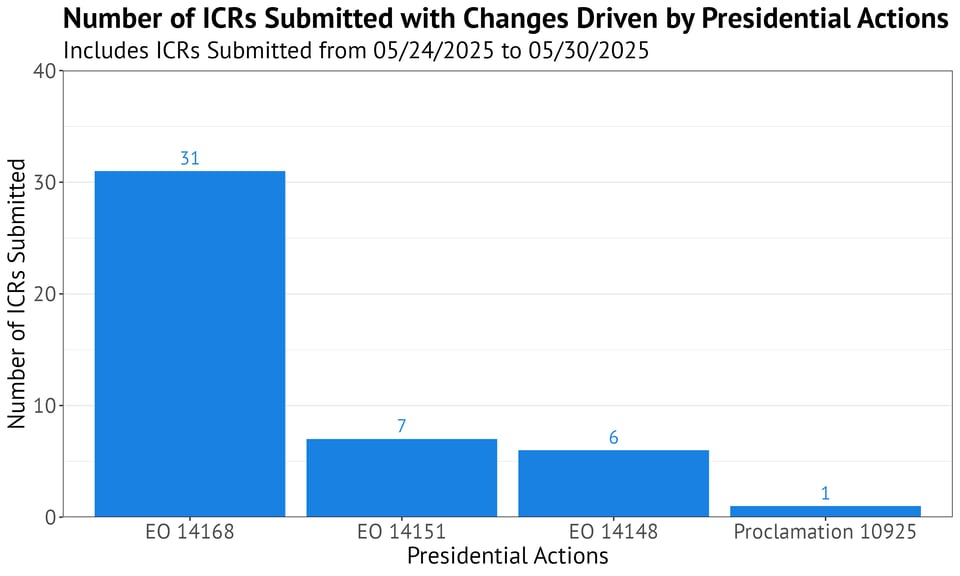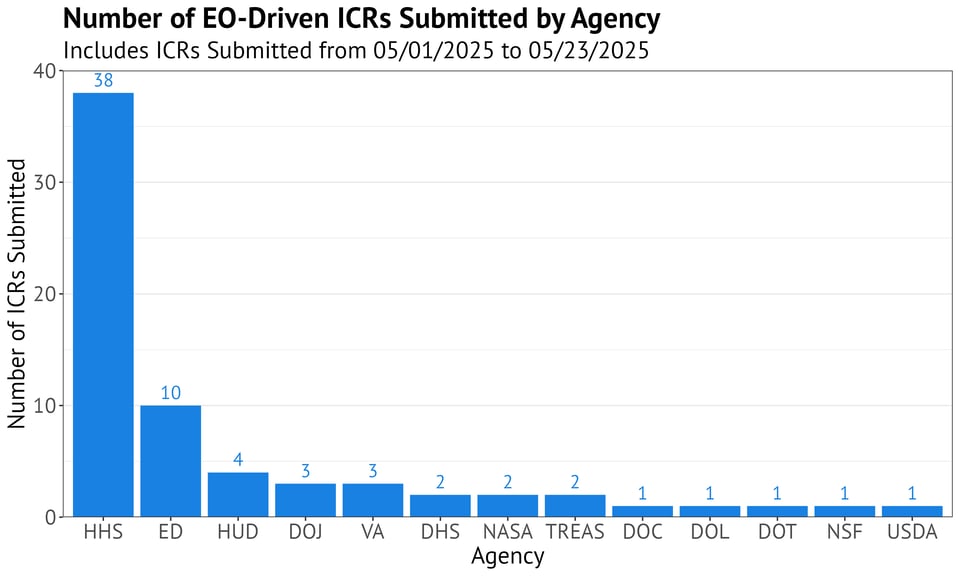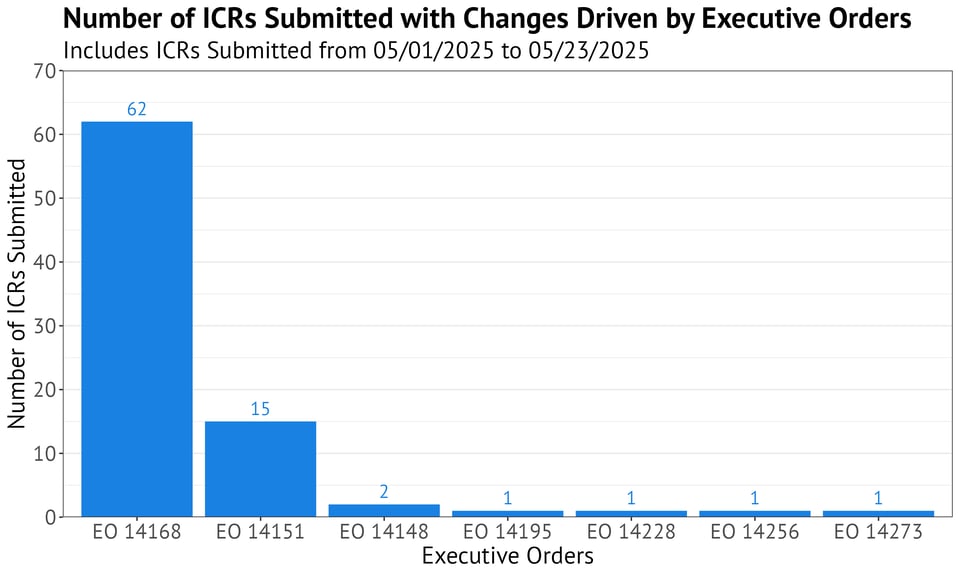-
Uncovering Changes to Federal Data: 05/24/2025 — 05/30/2025 ICR Roundup
June 03, 2025by Melanie Klein
Since January 20, 2025, new Presidential Actions, such as Executive Orders and Proclamations, have required federal agencies to subtly adjust what information they gather and how they ask for it. This is especially true when it comes to language about gender and diversity, equity, and inclusion (DEI). Federal data collections leave a digital trail on RegInfo.gov as they evolve, but some footprints are easier to spot than others.
by Melanie Klein
Since January 20, 2025, new Presidential Actions, such as Executive Orders and Proclamations, have required federal agencies to subtly adjust what information they gather and how they ask for it. This is especially true when it comes to language about gender and diversity, equity, and inclusion (DEI). Federal data collections leave a digital trail on RegInfo.gov as they evolve, but some footprints are easier to spot than others.
Tracking ICR Activity
Between May 24 and May 30, 2025, 101 Information Collection Requests (ICRs) were submitted. Of those, 32 ICRs were submitted specifically in response to Presidential Actions (bringing the May total to 102).
Of the Presidential Action-driven ICRs submitted between May 24 and May 30, 2025, 72% requested a “no material or nonsubstantive change to a currently approved collection.” This means minor changes can be made without extending the collection’s expiration date. Because these revisions don’t trigger a public comment period or a notice in the Federal Register, they can easily fly under the radar and move through a fast approval process.
Between May 24 and May 30, 2025, the Department of Health and Human Services (HHS) stood at the forefront of these changes, having submitted 26 ICRs in response to Presidential Actions. The majority of the HHS submissions came from ACF (16 ICRs), with the remainder from the CDC (3 ICRs), SAMHSA (3 ICRs), CMS (2 ICRs), and the NIH (2 ICRs).

Presidential Actions Behind These Changes
Carefully reviewing each ICR allowed us to pinpoint exactly which Presidential Actions agencies cited to justify their proposed changes:
31 ICRs driven by EO 14168: Defending Women from Gender Ideology Extremism and Restoring Biological Truth to the Federal Government, January 20, 2025
7 ICRs driven by EO 14151: Ending Radical and Wasteful Government DEI Programs and Preferencing, January 20, 2025
6 ICRs driven by EO 14148: Initial Recissions of Harmful Executive Orders and Actions, January 20, 2025
1 ICR driven by Proclamation 10925: Adjusting Imports of Automobiles and Automobile Parts into the United States, March 26, 2025

6 Notable Examples
To illustrate how Presidential Actions have shaped recent updates to data collections, here are 6 notable examples:
CDC’s National Health Interview Survey (NHIS)
The CDC/NCHS submitted a nonsubstantive change request on May 28, 2025, for the National Health Interview Survey. Citing EO 14168, the change memo states that the agency deleted two questions: “Do you currently describe yourself as male, female, transgender, nonbinary, or another gender?” and “(If ‘Another gender’ is selected) What term do you use to describe your gender?”
CMS’s End Stage Renal Disease (ESRD) Medical Evidence
CMS submitted a nonsubstantive change request on May 27, 2025, for the End Stage Renal Disease Medical Evidence Report Medicare Entitlement and/or Patient Registration. Citing EO 14168, the agency reformatted a question from “Sex Assigned at Birth, on Your Original Birth Certificate” to “What is Your Sex.” The change memo also cites EO 14151, stating the numbers of four questions that were removed, though it does not specify their content. By reviewing the form in the previous ICR, it appears that questions about gender, race, ethnicity, and country/area of origin or ancestry were deleted. Notably, the EO does not explicitly mention or require the removal of questions about race, ethnicity, or origin.
CDC’s Project SHIELD
The CDC submitted a nonsubstantive change request on May 28, 2025, for Project SHIELD (Surveillance of HIV-related service barriers among individuals with early or late HIV diagnoses). Citing EO 14168, the change memo states that the agency removed multiple questions and response options related to gender identity. Additionally, it revised the question on sexual orientation to exclude the options “queer” and “same-gender loving.”
ITA’s Automobile Parts Tariff Offset
The International Trade Administration (ITA) submitted a new collection on May 30, 2025, requesting emergency approval to be able to collect information from automobile manufacturers who are impacted by tariffs. Citing Proclamation 10925, the request states “that within 30 days of the date of the order the Secretary of the Department of Commerce (Commerce) shall establish a process by which automobile manufacturers could submit documentation supporting eligibility for an import adjustment offset amount.”
SAMHSA’s Information Collections
SAMHSA submitted three ICRs, all of which make changes to the information collected about gender and sexual orientation.
On May 28, 2025, a nonsubstantive change request was submitted for the Center for Substance Abuse Prevention Online Reporting Tool (CORT). Citing EO 14168, the change memo states that the agency replaced gender with sex and removed references to sexual orientation, harm reduction, and the disparities impact statement.
On May 30, 2025, a nonsubstantive change request was submitted for the SAMHSA Unified Performance Reporting Tool (SUPRT). Citing EO 14168, the change memo also states that the agency replaced gender with sex and removed sexual orientation questions.
On May 28, 2025, a revision request was submitted for the Training and Technical Assistance (TTA) Program Monitoring. While no EO was cited, the prior ICR stated that the annual TTA reports would present, at a minimum, the “percentages of participants of each gender and sexual orientation,” but the most recent ICR replaced this with “percentages of participants of each sex.”
ACF’s ORR Unaccompanied Alien Children Bureau
The ACF’s Office of Refugee Resettlement (ORR) Unaccompanied Alien Children (UAC) Bureau submitted three ICRs on May 28, 2025: a collection on Unaccompanied Alien Children Assessments for Children and Sponsors, a collection on Home Study and Post-Release Services for Unaccompanied Alien Children, and a collection on Incident Reporting for the Unaccompanied Alien Children Bureau. Citing EO 14168, all three replace “Gender” with “Sex,” offering only “male” and “female” as response options. Additionally, they require replacing “Unaccompanied Child” and “UC” with “Unaccompanied Alien Child” and “UAC” wherever they appear. Each also collects additional information on gang affiliation.
How to Stay Informed
Our ICR tracker at dataindex.us is updated daily with newly scraped data to surface these changes as they are proposed. We review every ICR on a weekly basis so you don’t have to, and our Tuesday blog posts highlight the latest developments. These quiet shifts in the federal data landscape may seem small, but they deserve our attention.
Sign up for blog updates and site alerts to follow the latest changes, and follow us on Bluesky.
-
Reading Between the Forms: How Executive Orders are Quietly Reshaping Federal Data
June 02, 2025by Melanie Klein
Federal data collections leave a digital trail as they evolve, but some footprints are easier to spot than others. Since January 20, 2025, new Executive Orders have required federal agencies to subtly adjust what information they gather and how they ask for it, especially when it comes to language about gender and diversity, equity, and inclusion (DEI).
by Melanie Klein
Federal data collections leave a digital trail as they evolve, but some footprints are easier to spot than others. Since January 20, 2025, new Executive Orders have required federal agencies to subtly adjust what information they gather and how they ask for it, especially when it comes to language about gender and diversity, equity, and inclusion (DEI).
By digging into RegInfo.gov, we found that 69 information collection requests have been filed between May 1 and May 23, 2025, for updates in response to these directives. Keep reading for insights into how this review process works and which data collections are being quietly rewritten to align with new policy priorities.
RegInfo.gov and ICRs 101
Thanks to the Paperwork Reduction Act, federal agencies can’t just ask the public for whatever information they want. First, they have to get approval from the Office of Management and Budget (OMB) by submitting an Information Collection Request (ICR).
OMB is the holder of government forms, surveys, data tools, methodology statements, and more. Agencies must submit an ICR with these documents every time they create a new information collection or revise an existing one, including the required renewal that comes every three years. These requests are publicly documented on RegInfo.gov, which serves as a centralized source of transparency and accountability for federal data collections.
While the primary purpose of ICRs is to ensure that federal collections align with statutory missions, avoid unnecessary or duplicative requests, and minimize burden on the American public, they also offer a valuable lens for spotting changes driven by Executive Orders. By sifting through supporting statements, change request memos, redlined surveys, and the amended forms themselves, you can uncover the story of the data collection, right down to how a single word in a question gets revised.
Tracking ICR Activity in May 2025
Between May 1 and May 23, 309 ICRs were submitted. Of those, a total of 69 ICRs were submitted specifically in response to Executive Orders.
Interestingly, 87% of these EO-driven ICRs requested a “no material or nonsubstantive change to a currently approved collection.” This means minor changes can be made without extending the collection’s expiration date. Because these revisions don’t trigger a public comment period or a notice in the Federal Register, they can easily fly under the radar and move through a fast approval process.
Agencies like the Department of Health and Human Services (38 ICRs) and the Department of Education (10 ICRs) stand out at the forefront of these changes, submitting the highest number of ICRs in response to Executive Orders.

Executive Orders Behind These Changes
Carefully reviewing each ICR allowed us to pinpoint exactly which Executive Orders agencies cited in May to justify their proposed changes:
EO 14168: Defending Women from Gender Ideology Extremism and Restoring Biological Truth to the Federal Government, January 20, 2025
EO 14151: Ending Radical and Wasteful Government DEI Programs and Preferencing, January 20, 2025
EO 14148: Initial Recissions of Harmful Executive Orders and Actions, January 20, 2025
EO 14195: Imposing Duties To Address the Synthetic Opioid Supply Chain in the People’s Republic of China, February 1, 2025
EO 14228: Further Amendments to Duties Addressing the Synthetic Opioid Supply Chain in the People’s Republic of China, March 3, 2025
EO 14256: Further Amendment to Duties Addressing the Synthetic Opioid Supply Chain in the People’s Republic of China as Applied to Low-Value Imports, April 2, 2025
EO 14273: Lowering Drug Prices by Once Again Putting Americans First, April 15, 2025

62 ICRs were driven by EO 14168, which states in Section 3(e) that “Agency forms that require an individual’s sex shall list male or female, and shall not request gender identity.” Resulting changes have involved deleting questions about gender identity and removing response options, such as “transgender,” “non-binary,” “don’t know,” and “prefer not to answer.”
15 ICRs were driven by EO 14151, which mandates “the termination of all discriminatory programs, including illegal DEI and ‘diversity, equity, inclusion, and accessibility’ (DEIA) mandates, policies, programs, preferences, and activities in the Federal Government, under whatever name they appear.” These ICRs typically remove textual references to DEI and DEIA.
Two ICRs were driven by EO 14148, which revoked various executive actions, including but not limited to orders advancing racial equity, LGBTQ+ equity, and DEIA.
The remaining Executive Orders – EOs 14195, 14228, 14256, and 14273 – were each cited in just one ICR, reflecting more targeted shifts.
10 Notable Examples
To illustrate how Executive Orders have shaped recent updates to data collections, here are 10 notable examples:
CDC’s National Youth Risk Behavior Survey
The CDC submitted a nonsubstantive change request on May 5, 2025, for the 2027 National Youth Risk Behavior Survey. Citing EO 14168, the agency deleted a question asking students, “Are you transgender?”
DOJ’s National Crime Victimization Survey
DOJ submitted a nonsubstantive change request on May 7, 2025, for the National Crime Victimization Survey. The agency had already cited EO 14168 in a March request that removed three questions about gender identity. The most recent request concerned a question about whether a victim’s gender or gender identity was a basis for a hate crime. While the probe instructions were updated to no longer clarify what “intersex” and “gender non-conforming” mean, the agency kept the question itself. DOJ stated that collecting this data does not conflict with EO 14168 due to BJS’s statutory requirement to report on Hate Crime Statistics and because “The Matthew Shepard and James Byrd, Jr., Hate Crimes Prevention Act of 2009 uses the term ‘gender’ and ‘gender identity’ as an actual or perceived characteristic that can be the basis for a hate crime.”
ED’s National Assessment of Educational Progress
The Department of Education (ED) submitted a revision request on May 15, 2025, for the 2026 National Assessment of Educational Progress. Referencing EO 14168 and EO 14151, both issued while this collection was being prepared for 30-day publication, the agency said that key demographic changes will appear in the 2026 instruments once finalized. While they stated that materials in the ICR’s package have been modified, signaled by multiple references to data on sex, they also added a note to the supporting statement emphasizing that the collection’s authorizing statute requires the Commissioner for Education Statistics to “collect information on race, ethnicity, socioeconomic status, disability, limited English proficiency, and gender.”
CDC’s HIV-Related Data Collections
The CDC submitted nonsubstantive change requests for two HIV-related data collections. On May 5, 2025, the agency cited EO 14168 in its revision of the National HIV Behavioral Surveillance System. In the updated eligibility screener, respondents who answer “Don’t Know” or “Refuse to Answer” to the question about sex cannot proceed to the Behavioral Assessment. In the Behavioral Assessment, 39 questions about sexual behavior for respondents whose sex does not align with their gender were removed. On May 14, 2025, citing the same EO, the agency revised a study on HIV/STD risk and PrEP use among men who have sex with men. In addition to written edits across multiple documents, several advertisement photos were also removed.
DHS’s International Mail Duty Worksheet
DHS submitted a new collection on May 6, 2025, requesting emergency approval for U.S. Customs and Border Protection to be able to collect data from “carriers that transport international postal packages to the United States as part of or on behalf of the international postal network.” The agency cited this information as necessary to implement EO 14256 and included EO 14195 and EO 14228 as additional authorizing statutes, all of which address the synthetic opioid supply chain in the People’s Republic of China.
ACF’s Generic Clearance for the Collection of Qualitative Feedback on Agency Service Delivery
The Administration for Children and Families (ACF) submitted a nonsubstantive change request on May 16, 2025, for the Generic Clearance for the Collection of Qualitative Feedback on Agency Service Delivery. Citing EO 14168, EO 14148, and recent Presidential actions related to DEI, the agency included a memo outlining changes to 14 information collections. Language related to DEI was removed and data collected on gender was updated to frame sex as a biological variable. While many agencies typically wait for OMB approval before implementing changes, this request notably stated: “In an effort to be responsive to the new administration’s requests, ACF has implemented many of these updated ICs in the field. To ensure ACF comes into compliance with the Paperwork Reduction Act as soon as possible, ACF requests immediate approval.”
HUD’s Youth Homelessness Demonstration Program
HUD submitted a nonsubstantive change request on May 8, 2025, for the Youth Homelessness Demonstration Program which supports communities in developing and implementing strategies to prevent and end youth homelessness. Citing EO 14168 and EO 14151, the agency deleted paragraphs of text from the ICR’s supporting statement. This included the removal of one of the program’s eight objectives: to “promote equity in the delivery and outcomes of homeless assistance.” The deleted text emphasized serving youth who are disproportionately affected by homelessness, “such as Black, Indigenous, Hispanic (non-white), and LGBTQ+ youth,” and required communities to “measure and demonstrate equitable delivery and outcomes.”
FBI’s Background Check Applicant Information Form
The FBI submitted a nonsubstantive change request on May 21, 2025, for the Background Check Applicant Information Form, Form 1-783. Citing EO 14168, the agency removed “Non-binary” as an option in the question about an applicant's sex.
HHS’s Health Professions and Nursing Student Loan Programs
HHS submitted a nonsubstantive change request on May 14, 2025, for the Annual Operating Reporting Form for the Health Professions Student Loan Program and Nursing Student Loan Program. Citing EO 14168, the agency replaced any references to “Gender” with “Sex” and removed a column labeled “Transgender or Nonbinary or Another Gender.” The agency was required to reverse 2024 changes to gender identification options made during the Biden Administration, following the Trump Administration’s rescission of EO 14075 on Advancing Equality for Lesbian, Gay, Bisexual, Transgender, Queer, and Intersex Individuals.
HUD’s Competitive Discretionary Funding Opportunity Announcements
HUD submitted a nonsubstantive change request on May 9, 2025, for a generic information collection that consolidates paperwork for HUD-issued competitive discretionary funding opportunity announcements. Citing EO 14168, the agency removed references to gender identity and sexual orientation from a statement regarding nondiscrimination assurances in housing. Additionally, citing EO 14151, the agency added language requiring the authorizing official to certify that they “will not use Federal funding to promote diversity, equity, and inclusion (DEI) mandates, policies, programs, or activities that violate any applicable Federal anti-discrimination laws.”
How to Stay Informed
So far, 69 ICRs have been submitted in May in response to Executive Orders, but hundreds more are likely on the way. Our ICR tracker at dataindex.us is updated daily with newly scraped data to surface these changes as they are proposed. We review every ICR on a weekly basis so you don’t have to, and our blog will continue to highlight key updates to major data collections. These quiet shifts in the federal data landscape may seem small, but they deserve our attention.
Sign up for blog updates and site alerts to follow the latest changes, and follow us on Bluesky.
-
Intro to the Information Collection Request (ICR)
May 29, 2025by Melanie Klein
An Information Collection Request (ICR) is a federal agency’s request for approval from the Office of Management and Budget (OMB) to collect information from the public. Under the Paperwork Reduction Act (PRA), agencies must justify why the information is needed and how it will be used.
Federal agencies are required to submit an ICR whenever they create, renew, modify, or discontinue an information collection. Each ICR includes a description of the collection, supporting materials and documentation (such as forms, surveys, or scripts), and proof that the agency has met the requirements of the PRA.
The ICR is submitted to the The Office of Information and Regulatory Affairs (OIRA) within OMB for review and approval. OIRA grants approval for a maximum of three years, after which the collection must be renewed through a new ICR submission.
ICRs are publicly available on RegInfo.gov, and additional guidance can be found in the FAQs.by Melanie Klein
An Information Collection Request (ICR) is a federal agency’s request for approval from the Office of Management and Budget (OMB) to collect information from the public. Under the Paperwork Reduction Act (PRA), agencies must justify why the information is needed and how it will be used.
Federal agencies are required to submit an ICR whenever they create, renew, modify, or discontinue an information collection. Each ICR includes a description of the collection, supporting materials and documentation (such as forms, surveys, or scripts), and proof that the agency has met the requirements of the PRA.
The ICR is submitted to the The Office of Information and Regulatory Affairs (OIRA) within OMB for review and approval. OIRA grants approval for a maximum of three years, after which the collection must be renewed through a new ICR submission.
ICRs are publicly available on RegInfo.gov, and additional guidance can be found in the FAQs.Why They Are Important
ICRs play a vital role in ensuring transparency and accountability in federal data collection. When federal agencies collect information from 10 or more "persons" (which includes individuals, businesses, and state, local, and tribal governments), they must submit an ICR to ensure that it fulfills their statutory missions, avoids unnecessary or duplicative requests, and minimizes burden on the American public. Additionally, Federal Register Notices (FRNs) and the opportunity for public comments provide a formal way for the public to be informed of proposed ICRs and participate in the process.
ICRs also serve as a key resource for tracking changes to federal data collections. The availability of detailed documentation, such as data collection instruments and methodologies, allows the general public to identify revisions in a timely manner. These may include revisions prompted by Executive Orders or statistical policies like OMB's Statistical Policy Directive No. 15 (SPD 15), which are often submitted as "nonsubstantive" or "nonmaterial" changes to a currently approved collection.[1] Furthermore, ICRs can help determine if a data collection has expired without renewal or has been intentionally discontinued. By reviewing ICRs, the public can better understand what data is being collected, how it evolves over time, and whether data collections have become inactive–often in response to shifting priorities and updated standards.
How To Use The Tool
Our ICR tracking tool offers a user-friendly view of ICRs that have been recently submitted, reviewed, or are nearing expiration. By aggregating key data from individual ICRs, the tool allows users to view the current status of each request, including submission, conclusion, and expiration dates, details on whether any changes were made, authorizing statutes, and more. Users can search for specific information and filter results based on various criteria. If seeking additional information, various text fields are hyperlinked to the full ICR on RegInfo.gov and associated resources. The tool is updated on a daily basis to reflect the most current information available.
Subscribe for Updates
Stay updated with our latest insights and analysis.